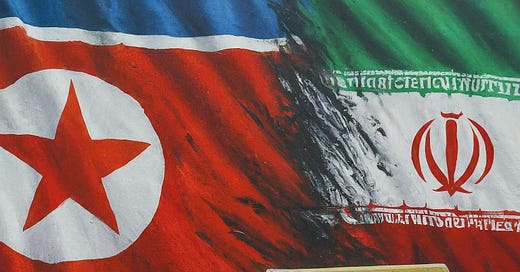SK calls out Russia for PoE veto; Dell computers in NK; Circumventing sanctions via BRICS & SCO; Iran oil ministry flush with hard currency
Prohibited Transactions for the week of 8 Apr 2024 (#44)
//Hi everyone, thanks for reading! I will be participating in an online panel discussion on the topic of “Revisiting sanctions on North Korea,” on Tuesday 23 April 2024 at 9am EDT. The panel is free and open to the public (though you need to register to attend). It is organized jointly by the GW Institute for Korean Studies and the Institute for Peace and Unification Studies at Seoul National University. I will be focusing on sanctions and the evolving relationship between the DPRK and Russia.
Also, between preparing for the panel discussion, as well as job hunting, I will need to take a week off from publishing. The next issue of Prohibited Transactions will come out on 26 April 2024.
North Korea
At the UN General Assembly (GA), Seoul continued its criticism of the recent Russian veto of UN Panel of Experts (PoE) on North Korea’s illicit activities, stating that Moscow vetoed the panel to hide information about the country’s illicit activities with the DPRK. South Korea’s ambassador stated “We will find another way to strengthen the monitoring mechanism and keep tracking DPRK's sanctions violations.”
Some nations suggested that the GA take on a greater role in enforcing North Korea sanctions. //Seems like an unwieldy proposition.
The US applauded South Korea’s recent sanctions on Russian vessels suspected of transporting weapons from the DPRK (see Issue #43).
South Korea and Britain concluded a joint maritime patrol to monitor for possible illicit North Korean activities, such as ship-to-ship transfers.
North Korean media is highlighting the country’s relationship with Russia, by establishing an archive of articles on the “friendly ties” between the two nations.
More commentary on the demise of the PoE notes the newly increased difficultly of enforcing international sanctions against North Korea, and that it is unlikely that any PoE-like group would be established in the future by the UN, due to the splits in the Security Council.
--
North Korean media recently showed Kim Jong-un inspecting a Workers’ Party of Korea (WPK) training school, and some of the images of the study areas showed a number of Dell computers set up for use. The desktop model appears to be sold in the PRC. //North Korean censors are not even bothering to try to conceal that the computers originated from a Western company. This is likely another situation where it would be pretty difficult for Dell sales staff to know the real end users of the computers, especially if there were a number of smaller purchases of the equipment made by Chinese nationals.
According to covert reporting from inside North Korea, the country has been importing large quantities of poor quality rice from the PRC since mid-March, in an attempt to stabilize rice prices in the DPRK.
Iran
Speaking at a press conference in Beijing, Russian Foreign Minister Sergey Lavrov stated “My colleague (PRC Foreign Minister Wang Yi) covered in detail the specific economic problems created by the unlawful policy of unilateral sanctions. We will address them within the framework of BRICS and the SCO.” Russian media reported on these comments, stating that “Russia’s top diplomat said his counterpart has come up with a formula for cancelling out the effect of sanctions.” //Russian media hyperbole aside, the use of BRICS and the SCO to “address” Western sanctions is something that Iran has advocated for and will benefit from.
During a SCO meeting, Iran and Kyrgyzstan agreed to launch a railway corridor connecting the two nations via Uzbekistan and Turkmenistan.
Iran’s Oil Ministry has “great forex reserves” and faces “no limitations on hard currency,” thanks in part to a rise in exports in the oil and gas sector, according to the country’s oil minister. //It appears both the Oil Ministry and the Central Bank of Iran are awash in hard currency. But the real question is, in which overseas bank accounts are the funds being held?
According to US and European officials, Iran continues to move down the path of producing a nuclear weapon to become a “threshold nuclear state,” but without actually producing a weapon.
--
The respective transport ministers from Iran and Iraq met recently and emphasized the importance of completing the construction of the Shalamcheh-Basra Railway. Construction of the 20-mile (32km) railway connecting the Iranian city of Shalamcheh to the Iraqi city of Basra started in September 2023, and is estimated to require 18 months until completion. // This rail line could one day facilitate transport between Iran and Syria,
Ahead of a visit by Iranian President Ebrahim Raisi to Pakistan, the two sides met to discuss expanding economic ties and commercial exchanges. This also includes Pakistani preparations for construction of the 80-kilometer section of the Pakistan-Iran gas pipeline (see Issue #41)
The European Union (EU) removed sanctions on a Iranian tech startup ArvanCloud, which was sanctioned due to its alleged involvement in internet censorship during nationwide protests in Iran in 2022. The US will maintain their sanctions against the tech company.



